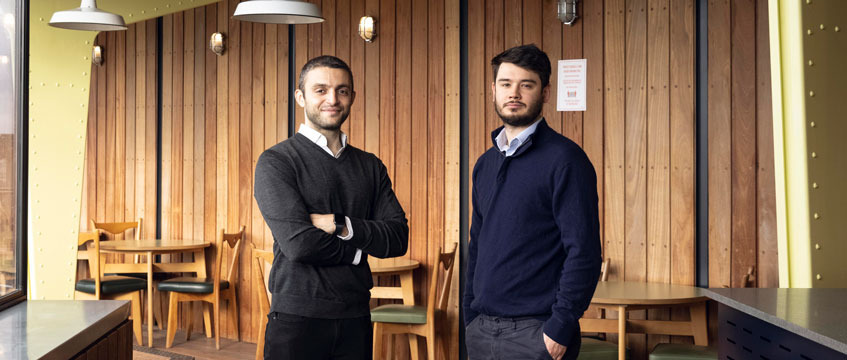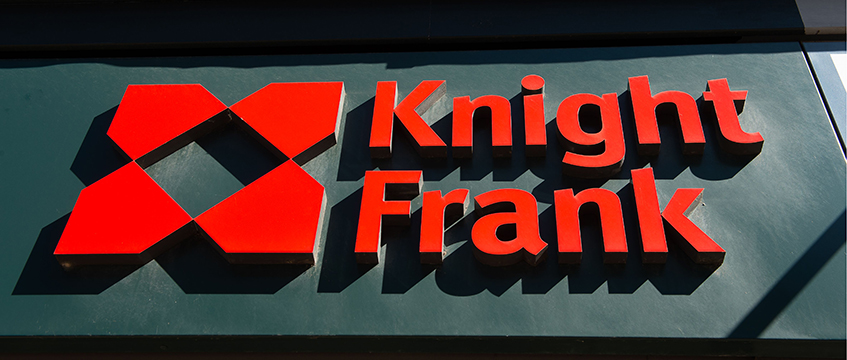When a company comes along with a goal to unlock more than £10bn currently sitting stagnant within real estate, it is going to attract some attention.
In a world where real estate tech can be as confusing and overwhelming as it is useful and efficiency-driving, the power of having such a focused and measurable USP should not be underestimated. Mind you, when one of our 2019 “Tech Ten to watch” joins forces with a former EG Rising Star, we would expect nothing less.
Majed Chaaraoui and Jack Sibley are the driving force behind Insurami, a tech firm that rips up the rule book on traditional deposits and offers commercial real estate tenants an alternative to locking up their cash. Launched by founder and chief executive Chaaraoui in 2019, the business effectively operates as a large-scale deposit guarantee platform and is currently used by companies including the Howard De Walden Estate, Level39 and Huckletree. Last month the platform announced a £42m raise and now plans to expand; within the offices sector where it is currently focused and into new asset classes including retail and industrial.
Insurami’s business model is simple. Rather than forking out a hefty deposit in one go, tenants pay a monthly fee to the platform for a deposit guarantee. This then pays out to the landlord – up to the maximum cover value of £600,000 – if there is a default on the lease. It is a tech solution that Chaaraoui and Sibley believe will release billions of pounds of otherwise illiquid funds caught up in the real estate sector. Add to this the fact that the platform helps landlords and agents close deals faster by offering data capture around tenant risk profiles while simultaneously helping occupiers secure new space by saving more than 95% on upfront costs and you are verging on too-good-to-be-true territory.
A new market standard
So is it too good to be true? Sibley doesn’t think so. Nuveen’s former head of innovation & technology strategies joined as head of partnerships in September last year with the firm belief that Insurami has the firepower and wherewithal to deliver exactly what it promises. “Insurami is one of the very few proptech companies I have come across that really brings fintech into real estate,” he says. “It is basically creating a new financial product that we believe will be a new market standard in leasing.
“The amount of money tied up in deposits across this country would be enough for a small stimulus package. If all that cash can be used by businesses to actually invest and grow, it won’t just be a positive for the real estate sector but for the economy. Cash deposits have been one of the main risk management approaches used by landlords for a long time,” he adds. “We are not saying these will now cease to exist. We are saying they are a very capital-inefficient and binary way of managing risk and we believe there is a more sophisticated approach.”
Good news for the tenant – especially post-Covid when many businesses are looking for cost savings after a tough couple of years – and good news for the landlords who will get the same level of protection plus a hefty chunk of additional data on their would-be tenants courtesy of the platform.
Insurami has built an in-house AI model which predicts the likelihood of tenant default. Trained on more than 7bn data points, the model makes an instant decision on whether a tenant should be granted a guarantee based on live data. This is backed up with the latest financial data that each applicant has available procured via a one-time, read-only data pull as Insurami integrates into their accounting software. “This approach has been common within fintech and finance for the last 12-18 months but rarely used in commercial real estate,” says Sibley. The whole process takes about 15 minutes
The result, adds Chaaraoui, is not just a platform that can save tenants upfront costs: it streamlines the leasing process. It all sounds great in theory. But what if something happens that is beyond Insurami’s control which means a number of claims suddenly need to be paid out as people default on their lease agreements? Something entirely unexpected. Something like a global pandemic, perhaps.
“Like most companies, we were affected by Covid as leasing activity basically ground to a halt,” says Chaaraoui. “But it allowed us to really stress test the business model. Paying out a lot of claims was something we went through a couple of months into Covid. We now have live case studies where we can show that claims were paid within five or 10 days.”
He adds that Covid accelerated a large part of their ultimate business plan. “The pandemic means we spent a lot of time talking to landlords about the sectors we were thinking of expanding into.”
This means that as leasing activity returns to the market, Insurami not only has a platform designed to target a very specific part of the real estate life cycle as businesses scramble to get back up and running, but it has also identified a swathe of new sectors to bring on board and is able to offer significant upfront savings to cash-strapped companies. And it is this expansion that caught the eye of the investors.
Expansion plans
Last month EG revealed that Fasanara Capital had joined existing investors including Global Founders Capital, Entrepreneur First and Clocktower Ventures in a £42m raise to facilitate Insurami’s expansion plans.
This expansion will focus on both fine-tuning the existing service for the offices sector and moving into new sectors including retail, industrial and dark kitchens.
Offices will remain Insurami’s priority, says Sibley, working with the conventional and flexi markets along with everything in between, including managed services. Then there is the “whole new world” for the platform. “Retail, both conventional and flex, are very interesting markets,” says Sibley. “We will be looking especially at F&B businesses looking to bounce back as the world opens up. We can be there to support them and allow them to open up and expand without having to pay tens of thousands, sometimes even hundreds of thousands of pounds, every time they open a new site. On the industrial side, there are two main areas of focus; multi-let industrial and new concepts such as dark kitchens.”
Having a role in helping so many businesses get up and running or, indeed, back up and running post-Covid is something Sibley and Chaaraoui feel particularly strongly about. Proof that this platform is not just about removing large upfront payments as a preference, but as a necessity. For many businesses, removing the pressure to find the funds for a deposit upfront could be the difference between getting back on their feet or not.
Catching the wave
Of course, the Insurami model is about more than helping businesses bounce back after a difficult time. The platform was set up pre-Covid and, says Sibley, was launched just at the right time to ride a wave that has been heading towards the real estate sector for some time.
“The last five years have been about the growth of proptech in real estate,” he says. “The next five will be about true disruption and that disruption will come from fintech. Lots of fintech solutions have already proven to be very competitive within the finance and fintech worlds over the past few years and they are heading to real estate now to disrupt the sector and take a bigger slice of the pie. Where is the real money in real estate? It is not actually in the operation of assets. It is in transactions. I genuinely believe that most exciting start-ups over the next few years won’t be around operation or management. They will be at the point of transaction.”
To send feedback, e-mail emily.wright@eg.co.uk or tweet @EmilyW_9 or @EGPropertyNews











